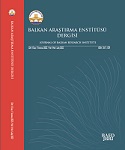IMPACT OF NATIONWIDE ELECTORAL THRESHOLDS ON PARTY SYSTEM FRAGMENTATION AND DISPROPORTIONAL REPRESENTATION IN GREECE AND TURKEY
IMPACT OF NATIONWIDE ELECTORAL THRESHOLDS ON PARTY SYSTEM FRAGMENTATION AND DISPROPORTIONAL REPRESENTATION IN GREECE AND TURKEY
Author(s): Burcu Taşkin, Berfin ÇakinSubject(s): Political history, Government/Political systems, Electoral systems, Post-War period (1950 - 1989), Transformation Period (1990 - 2010), Present Times (2010 - today)
Published by: Trakya Üniversitesi Balkan Araştırma Enstitüsü
Keywords: Party System; Nationwide Electoral Thresholds; Greek Politics; Turkish Politics; Disproportional Representation;
Summary/Abstract: Nationwide electoral thresholds (NETs) are known to secure a parliamentary majority for the largest party, reduce party system fragmentation, and prevent extreme, minor, or non-core group parties from entering parliament. By comparing Greece and Turkey, which have applied NETs since 1993 and 1983 respectively, this article investigates why some of these aims have not been achieved. Using time-series data since 1950, we show that neither country needed to introduce NETs to establish single-party governments. Rather, they were implemented primarily to prevent noncore groups from entering parliament as a party. This caused disproportional legislative representation, especially in Turkey. Although Turkey’s NET initially reduced the raw number of parties contesting elections, this effect weakened in the long run and, in contrast to the literature, increased party system fragmentation. Finally, extreme parties have benefitted from Greece’s fragmented party system since 2012 whereas electoral engineering in Turkey has failed to prevent non-core groups from passing the electoral threshold.
Journal: Balkan Araştırma Enstitüsü Dergisi -Trakya Üniversitesi
- Issue Year: 11/2022
- Issue No: 1
- Page Range: 233-267
- Page Count: 35
- Language: English

